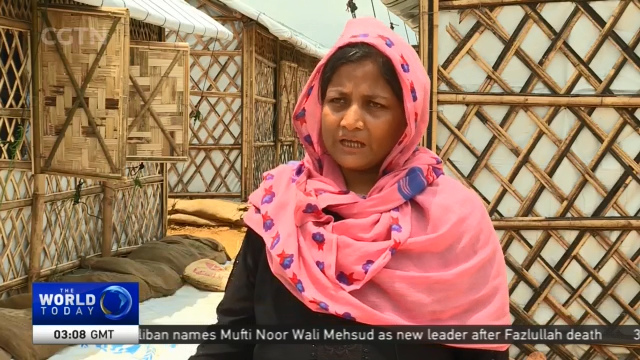
11:45, 24-Jun-2018
Relocation of Rohingya Refugees: Monsoon is the new threat for Rohingyas
02:54

Around 200-thousand Rohingya refugees are under threat from heavy rains. That's according to international aid agencies, which, with Bangladeshi authorities, are racing against time to protect migrants from landslides and flooding. CGTN's Ravinder Bawa reports.
For Sayeda Khatun the physical pain of her broken hip is meaningless when she thinks of her three-year-old son Mohammed Fakran. On 17th June she lost him to heavy rains when the wall of her house fell on them while they were asleep. She did not have enough money to afford the extra bamboo so the family had to make a mud wall which became the cause of her loss.
SAYEDA KAHTUN ROHINGYA REFUGEE "I feel miserable. I am sad. As a mother I cannot bear this pain. What to do? It was god's will so this happened. I just have to accept it. I am feeling sad and am missing my son."
Rohingya refugees live in congested refugee camps in makeshift shelters on hilly areas without any protection from storms and rains. This part of the country records highest rainfall and is prone to cyclones. Aid and government officials have been facing challenges in moving refugees to safer areas.
RAVINDER BAWA KUTUPALONG CAMP "123 acres of new forest land is being flattened to prevent any loss of life due to landslide. About forty thousand families have been relocated to new tent cities like this, which is not even half the number of people who are at risk this monsoon."
New shelters are being constructed on war footing as the monsoons have entered Bangladesh. The warning of a human catastrophe is forcing the authorities to engage huge manpower to make bamboo and tarpaulin homes suitable for relocating refugees.
Refugees like Sanjida Khatun are reluctant to relocate as it is the second uprooting for them since they crossed the border from Myanmar last August after a military crackdown. She protests that new shelters are not big enough to accommodate her family of eight.
SANJIDA KHATUN ROHINGYA REFUGEE "There will be no landslide. We will not die. But we will face many difficulties here. After meals we will have no space to rest or sit. We were promised comfort here but we will be uncomfortable."
These shanties will be the only shelters for the refugees when harsher weather hits the coast. In the absence of proper cyclone shelters this will be the only place where they can hide against the high winds or cyclones which are common here. Ravinder Bawa, Coxs Bazar.

SITEMAP
Copyright © 2018 CGTN. Beijing ICP prepared NO.16065310-3
Copyright © 2018 CGTN. Beijing ICP prepared NO.16065310-3